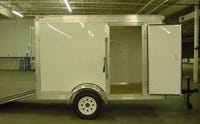Eliminating the oils and plasticizers typically used to soften the materials, a new class of elastomers claims to offer higher performance for longer durations at more extreme temperatures. Wayne Rodrigue, CEO Exousia Advanced Materials, told MPW his company’s RPA thermoplastic olefin (TPO) also eliminates exposure to hydrogen peroxide as a manufacturing step with a proprietary process that results in covalent bonding between the crosslinked rubber and its olefin matrix.
May 14, 2009
Eliminating the oils and plasticizers typically used to soften the materials, a new class of elastomers claims to offer higher performance for longer durations at more extreme temperatures. Wayne Rodrigue, CEO Exousia Advanced Materials, told MPW his company’s RPA thermoplastic olefin (TPO) also eliminates exposure to hydrogen peroxide as a manufacturing step with a proprietary process that results in covalent bonding between the crosslinked rubber and its olefin matrix.
|
Coming to market with 14 formulations, Exousia has spent the last two years developing commercial applications for the technology and proving its viability. This work included testing with General Motors to have the resin validated for use in automotive components. Exousia says theses tests proved the material dimensionally stable from 40°F-140°F. While oils and plasticizers can leach out of a part like a dashboard over time, resulting in fogging of the windshield and a brittle, discolored instrument panel, Rodrigue says Exousia materials have zero migration or durometer change.
Among the truly novel characteristics of the material, according to Rodrigue, is that it actually gets tougher the colder it gets; when melted, it exhibits thixotropic properties, flowing like water; and it can be rigid or soft, with a durometer range from 55-95 Shore A. Exousia says the product is suitable for all major plastic converting technologies, save rotational molding, and it sees it as a viable replacement to engineering plastics like ABS, offering more impact, and nylon, being hydrophilic as opposed to hygroscopic. —[email protected]
About the Author(s)
You May Also Like



